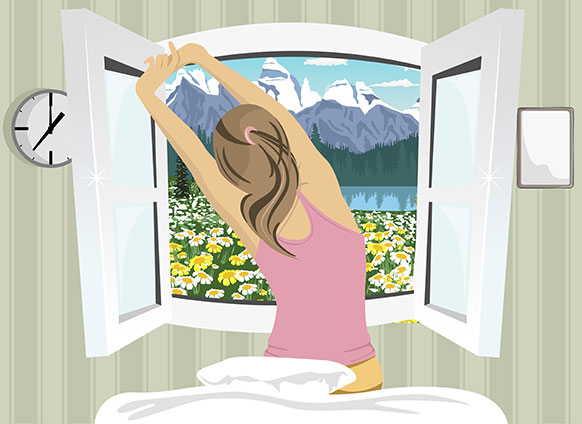1. Create a night routine.
The most important part of waking up early is going to bed the correct way. This doesn’t mean simply turning in earlier. It means making a schedule that will convert waking up from a groggy bore to an exciting and efficient part of your day. The night before, I like to prepare breakfast as much as possible. For example, if I knew I was going to eat a veggie omelet, I would chop the vegetables and store them in the fridge overnight. This minimizes the amount of thinking you have to put into cooking breakfast, and will most likely lead to a healthier first meal, instead of grabbing a granola bar on your way out the door.
It’s also important to set goals for yourself before you sleep. According to author and productivity consultant Helene Segura, making a list of three things you want to accomplish the next day is called “mind liberation” and can help you sleep better and wake up more focused. I like to make my goals more about house chores and hobbies rather than work. Some of the things that made my list were dropping off laundry, reading an article I bookmarked a month ago and shopping for upcoming birthdays and holidays.
Also remember, the definition of routine is “a sequence of actions regularly followed,” meaning don’t change it up. I like to make breakfast, make my list and then watch one, 30-minute episode of a show before sleeping. Routines help train your body to know when it’s time to shut down, which makes falling asleep easier.
2. Ease yourself into your desired wake-up time.
Do not start this process by setting your alarm two hours earlier than usual and expect to get up—because you won’t. Gradually adjust your bedtime and wake-up time so the change doesn’t feel unnatural.
Every day, for the first 24 days, I set my bedtime and wake-up alarms 5 minutes earlier than I did the day before. By day 24, I was falling asleep at 10 p.m. and waking up at 6 a.m. For me, getting to bed on time was the harder of the two, but once I put into place a bedtime routine that didn’t include binge-watching Netflix, waking up became much easier.
You can take it even slower than I did. Try setting your alarm just 1 minute earlier each day until you reach your goal wake-up time. Although this takes longer, it also carries a higher probability of sticking with your early bird goals.
Note: None of these tips will help you if you’re a persistent snoozer. Use some willpower and get your feet on the floor after the first alarm.
3. Don’t scroll.
Most likely your alarm is on your phone, and once your phone is in your hand, there is a temptation to check social media or email. Avoid this. Sitting in bed for an hour scrolling through your phone defeats the purpose of waking up early in the first place.
It also helped me frame my mornings as a self-care routine, and looking at the perfectly filtered lives of my peers before I’ve even brushed my teeth didn’t exactly make me want to leap out of bed and take on the day. Make this morning time about you and not what else is going on in the world.
4. Work out.
This might seem farfetched for some who barely have time to put on pants in the morning, but working out in the morning is the No. 1 way to start your day on a positive note.
I didn’t go to the gym but instead made my exercise more leisurely. I only added it into my routine after the first 20 days, but once I started, I would alternate between walks in my neighborhood park and low-intensity yoga. Morning exercise has proven to kickstart your metabolism and ensure you get a workout in before the busy day swallows your schedule.
Whatever your goal is, start small. Take it day by day and don’t get frustrated when you aren’t progressing as quickly as you’d like.












